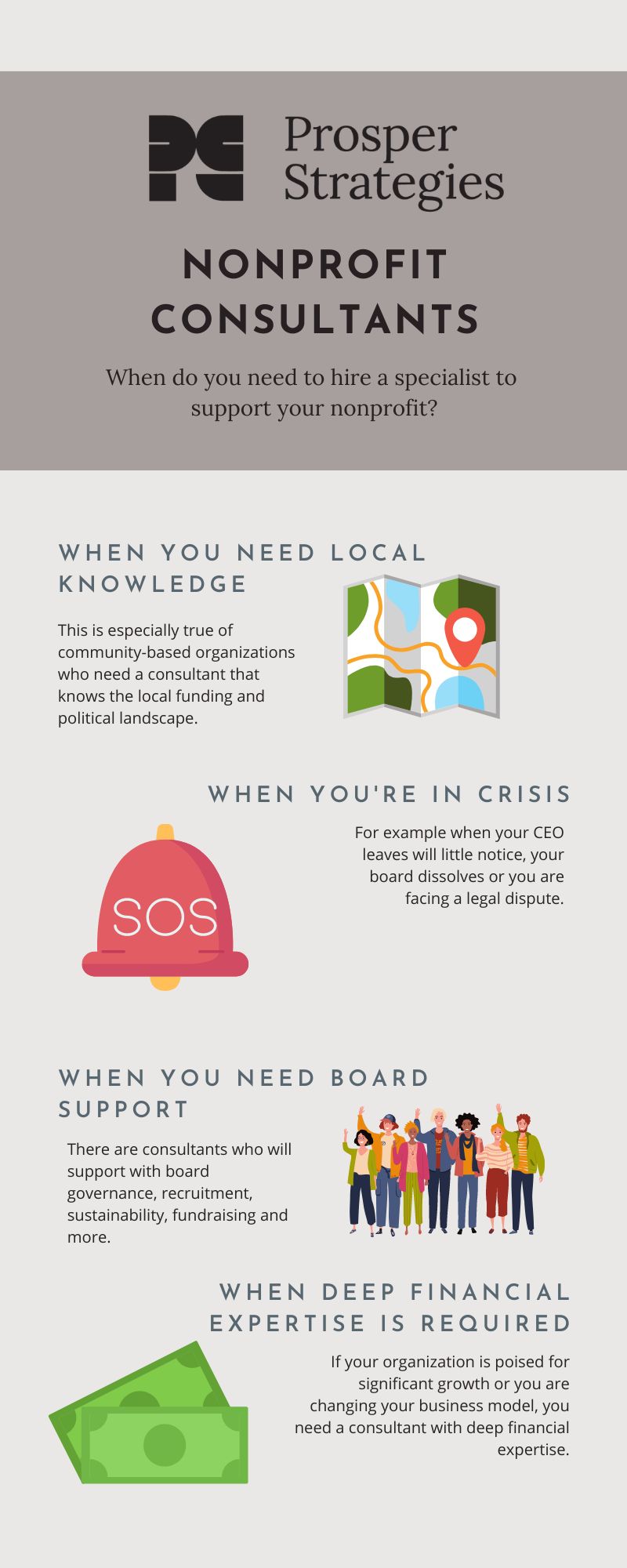Prosper Strategies hasn’t always been exclusively a nonprofit consultancy. When we started a decade ago, we knew we wanted to focus on supporting social impact organizations with strategy development, but our client set was broad. We worked with do-gooder for-profit companies, social enterprises and, of course, nonprofits (always our favorite).
However, not too far into our firm’s establishment, we decided that although we appreciate every organization that takes a triple bottom line approach, we wanted to focus our expertise solely in the nonprofit arena.
Why? We recognized a pattern of challenges that nonprofits face, unique to the social sector, and we wanted to continue to build deep expertise around helping our clients solve these challenges. During this time, we’ve worked with organizations large and small in human services, education, youth development, healthcare, arts and culture and so many more. And, while we haven’t touched every subsector in the nonprofit world, we’ve worked in a lot of them.
Every so often I get asked, usually by a potential client, have ever worked in blank subsector? And if not, does it matter? What I share with those who ask me this question is that no one knows your organization, programs, initiatives and stakeholders the way you do. In order to be prepared to lead deep strategic engagements tailored to the unique needs of your subsector and your nonprofit, Prosper Strategies engages in a period of discovery, where we take a deep dive into the organization, the ecosystem in which it operates as well as the perspectives and needs of the nonprofit’s specific stakeholders – but you are the experts. It’s our job to facilitate a process and ask the right questions to elicit outcomes that are going to be ambitious, yet also realistic for your nonprofit to execute. To do this, we don’t necessarily have to have deep expertise in your specific subsector.
With that being said, I do think there are situations when nonprofits require more specialized nonprofit consultants that focus in on a specific sub-sector or two, or on a specific type of strategic challenges. There are also certain types of organizations that are well suited to working with specialists. Here are a few of those situations and organizations.
When your nonprofit requires boots on the ground
Community-based organizations that serve very specific geographies–for example a specific neighborhood in Seattle–can benefit from working with a local or community-based nonprofit consultant. Local consultants that specialize in hyperlocal work know the community, its challenges and opportunities as well as the local funding and political landscape. While a remote nonprofit consultant can learn about some of these things and may be able to get up to speed, there is most certainly a capable local resource who will already know the community like the back of their hand. Sometimes, it may even make sense to pair with a local consultant who has community expertise and presence with a remote consultant or firm that may have capabilities or experience the local consultant lacks.
When your nonprofit is in crisis
When your nonprofit is experiencing a challenge (imagine your CEO leaves with little notice, your board dissolves, or you are facing a legal dispute… I don’t wish these things on any of you), you could benefit from working with a consultant or consulting firms that is specifically designed to support organizations through these issues. There are also nonprofit consultants who specialize in serving as interim nonprofit CEOs who will often step in when an organization is in crisis.
When you need specific support with board development or education
Again, there are nonprofit consultants dedicated to helping nonprofits specifically with board governance and sustainability. This includes training and workshops on topics that range from fundraising to strategic planning.
When your planning needs call for deep financial expertise
If your strategic planning process is going to require robust financial modeling and planning – for example you’re poised for or experiencing significant growth, you are changing your nonprofit business model or you are launching a social enterprise – you will want to work with an individual or firm that specializes in nonprofit strategic planning with a financial lens (and there are many)!
If your organization is in one of these specific subsectors
In addition to situations like these that may call for a partnership with a highly specialized nonprofit consultant, there are also specific types of organizations that can benefit from partnering with consultants dedicated specifically to their subsector. A few of the types of organizations we’ve found tend to work best with highly specialized consultants that only work in their subsector include:
- Community foundations
- Federally Qualified Health Centers (FQHCs)
- Universities and higher education institutions
- Churches and faith-based organizations
- Arts and culture institutions
If your organization is in one of these subsectors, finding a specialized consultant might be beneficial, but there are also times when working with a more multi-disciplinary nonprofit consultant can have its benefits, too. For example, the Muhammad Ali Center (an arts and culture organization) chose to work with us (rather than an arts and culture specialist) to develop their three year strategic plan because the organization was looking to expand beyond its arts and culture roots and local focus and become an organization focused on social justice nationally and globally.
I’ll conclude by sharing that for nonprofits, if you choose to work with a consultant or firm, nonprofit specialization is a must. Subsector expertise can be important too, but for most situations and organizations, it’s going to be most beneficial to partner with a firm that has broad experience working with a wide range of missions and organization types. The relationship between consultants and their nonprofit partners is ultimately the most important factor in any relationship. I always say, “Our success is our clients’ success.” There must be transparency and trust between the two parties in order for real change, and therefore positive impact, to occur.
